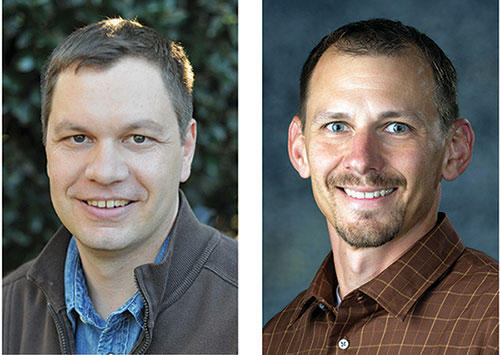
As groundwater becomes an increasingly hot topic in Nebraska, UNL's School of Natural Resources is poising itself to be at the forefront of groundwater research and analysis.
The school recently welcomed two groundwater hydrologists to its faculty: Troy Gilmore and Jesse Korus.
"Nebraska has vast water resources," Gilmore said. "But there are many challenges to ensuring that water is available when needed, and that it is of appropriate quality for its intended use."
Gilmore comes to UNL from North Carolina State University, where he earned his doctorate in biological and agricultural engineering. His appointment is split between SNR and the Department of Biological Systems Engineering.
"With these appointments, I have an opportunity to collaborate on projects from a whole-system perspective," Gilmore said. "I am also excited to be a part of the Conservation and Survey Division in SNR, which has historically been an important resource for citizens and stakeholders interested in the source, quantity and quality of groundwater in Nebraska."
Gilmore's research focuses on quantifying the availability of water resources, particularly in western Nebraska, and on supporting the effective and efficient management of those resources.
"Availability is dependent on both water quantity and quality," Gilmore said. "My first projects will quantify groundwater recharge rate and quality to assess the impact of changes in irrigation management. I will also investigate the interaction of groundwater with streams and rivers."
In his new role, Gilmore said a primary objective is establishing relationships between stakeholders and scientists in Nebraska – a sentiment echoed by Korus.
"It is a challenge to stay on top of the complex, rapidly-evolving water issues across the state," Korus said. "So it is important to stay connected with stakeholders and to monitor the status of research needs by attending meetings, conferences and making phone calls."
Korus frequently worked with stakeholders across the state in his previous position as a survey geologist in the Conservation and Survey Division. He earned his doctorate from UNL's Department of Earth and Atmospheric Sciences earlier this year.
As a groundwater hydrologist, Korus studies both groundwater and the heterogeneous materials through which groundwater flows.
"Understanding aquifer heterogeneity is key to understanding patterns of groundwater flow, stream-aquifer connections and the effects of pumping on water supplies," Korus said. "I use basic field work, borehole drilling and geophysical techniques to understand the basic 'structure' of aquifers. This information is critical to sustaining a long-term supply of water in a changing world."
Currently, Korus is investigating the geological origins and hydrogeological frameworks of buried valleys – ancient valleys now covered by sediment. These valleys are common in Nebraska and host important aquifers throughout the state, Korus said.
When it comes to the future of groundwater in Nebraska, both researchers are thinking big.
"I plan to establish a highly reputable research and extension program aimed at understanding the High Plains aquifer system," Korus said. "SNR's historical connections with Natural Resources Districts, state agencies, well drillers and other organizations across Nebraska will help me build key connections and collaborations."
"Within five years I would like to be an asset to the people of Nebraska and beyond," Gilmore said. "I want to provide the necessary expertise in groundwater hydrology to address critical questions of water resource management."
— Mekita Rivas, Natural Resources